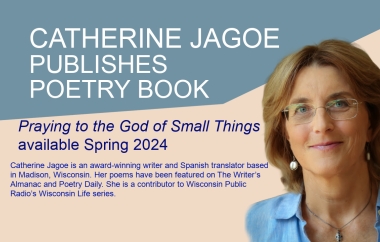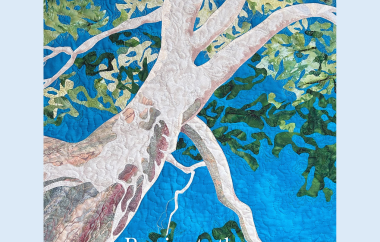Catherine Jagoe Publishes New Book of Poetry
Catherine Jagoe Publishes New Book of Poetry
We are excited to share that recent KHN writing alum, Catherine Jagoe, has a new book of poems that came out this spring. Praying to the God of Small Things is now available for purchase at Amazon and Kelsay Books. Congratulations to Catherine, who we were lucky to have read some of these poems in person at our April Third Thursday event last month, and she also sent us a copy of this amazing book of poems. So many beautiful, astute ruminations about the awe and terror of the creatures that live and die here on our changing planet.
From the Publisher:
Catherine Jagoe is an award-winning writer and Spanish translator based in Madison, Wisconsin. Her poems have been featured on The Writer’s Almanac and Poetry Daily. She is a contributor to Wisconsin Public Radio’s Wisconsin Life series.
Reading this gorgeous and brilliantly articulated book, I felt alternately elated and riven. Jagoe’s language as she describes a range of more-than-human worlds balanced on the edge of disappearance is both ravishingly lovely and steadfastly unflinching. “[A]ren’t we all / dying/, aren’t we all beautiful?” she asks, in poems palpable with love for the inhabitants of this planet, whether they be insects, hummingbirds, warblers, muskrats, sycamores, stray dogs, or fellow human beings. Nothing is too small for this poet who learned early on “the sweet wild witchery” and sheer “wonderment” of our world. A fiercely sad but also ferociously celebratory collection by one of our most attentive, eloquent, and important eco-poets, this book is a hymn for our time.
—Alison Townsend, author of The Green Hour
"At times the soothsayer, at times the scientist, the narrator of Praying to the God of All Things weaves astonishment and horror as she looks unflinchingly at the realities of our changing biosphere and its disappearing creatures. These exacting poems telescope in and out, braiding the tangible effects of climate change and keen observations of the leafhopper, the killdeer feigning a broken wing, the “lemonbright” of finches, moss. Never steering away from the complicity of being human, she meanwhile wields the very human power of language, deftly speaking for the wondrous more-than-human world, compelling her readers to “stand still and listen, just listen/ trying to name every song.”
—Heather Swan, author of Where the Grass Still Sings



